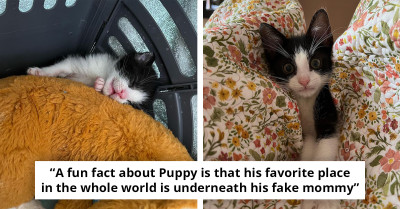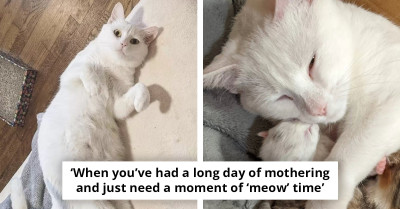
40 Hilarious "Dog People Vs. Cat People" Tweets To Make Your Day
"You don’t hate cats - you just can’t handle rejection."

Many believe that the most significant differences between people are caused by their political or religious beliefs. They are so wrong. Obviously, they’ve never witnessed a “cat people vs. dog people” debate.
The arguments are flying left and right, blood is boiling… This debate is old as time, and it will never end. We are kidding, of course. There are no hard feelings between the two groups, as the most important thing is that we are all animal lovers here, no matter if it’s cats or dogs.
Although, it’s pretty apparent that one group loves the wrong animals….We have compiled a list of the best “cat people vs. dog people” tweets, and we know you will love them.
1.
 SethEverman
SethEverman2.
 hleneeh
hleneeh3.
 simonsinek
simonsinek4.
 AliKolbert
AliKolbertBut are the cat and dog people really that different? They appear to have slightly different personality characteristics, and the question of what precisely separates them remains open to discussion.
Molly De Voss, a certified feline behaviorist, says that dog people "tend to be more "outdoorsy" than cat people," but she added: "that said, I like to hike—with my cat, of course."
5.
 DenisHolton
DenisHolton6.
 TomKilianArt
TomKilianArtFurthermore, “more women tend to own cats than men—partly because cats are seen as feminine and dogs more masculine; and partly because cats gravitate to women more because their voices are in a megahertz range similar to their meows.”
Molly also noticed stronger feelings about felines since “more people (usually men) really dislike cats than they do dogs.”
“I think that may limit a single woman’s opportunities in the dating pool—especially if she has multiple cats. However, I have several male cat-owning clients who are neither gay nor neurotic, so obviously, there’s no 100% stereotype that fits all,” Molly concluded.
7.
 wokedrugguy
wokedrugguy8.
 paperbeatstweet
paperbeatstweetAnd what does science have to say about this? Beatrice Alba, a psychology lecturer at Deakin University, says that the most significant differences seem to be between persons who self-identify as a "cat person" vs a "dog person."
"But, of course, you don't have to choose between the two—plenty of people identify as both or neither. Having said that, although we found statistically significant differences between cat people and dog people on some psychological measures, the size of the effects were not huge."
9.
 Soren_Ltd
Soren_Ltd10.
 queensandal
queensandal11.
 Joaoninguem_art
Joaoninguem_artBeatrice’s research found that “dog people scored significantly higher than cat people on competitiveness, and a characteristic called Social Dominance Orientation. This is essentially a preference for hierarchy and the belief that some groups of people should dominate other groups of people.”
The researchers concluded that “people prefer pets that complement their own personalities, so someone more inclined towards characteristics related to social dominance should prefer a more submissive pet, like dogs.”
In the meantime, “Those who are not so attached to hierarchies and ranking highly within them may be more inclined to like cats, who we all know defer to no one,” Beatrice concluded.
12.
 justcaem
justcaem
13.
 MaraWilson
MaraWilson
14.
 ComedyCentral
ComedyCentral
15.
 TheWeirdWorld
TheWeirdWorld
A study conducted by the psychologist Samuel D. Gosling from the University of Texas in Austin, in which 4,565 people were asked whether they were dog people, cat people, neither, or both, tried to answer these questions.
Gosling concluded: "There is a widely held cultural belief that the pet species—dog or cat—with which a person has the strongest affinity says something about the individual's personality, and this research suggests there are significant differences on major personality traits between dog people and cat people."
16.
 ProZD
ProZD
17.
 ellaharg
ellaharg
18.
 clhubes
clhubes
19.
 eligit
eligit
20.
 ellle_em
ellle_em
21.
 KivanBay
KivanBay
The research showed that dog people were usually 15% more extroverted, 13% more agreeable, and 11% more diligent than cat people. It also showed that cat people were 11% more open-minded.
22.
 vivalatony
vivalatony
23.
 robicellis
robicellis
24.
 AGhostlerer
AGhostlerer
25.
 jon_snow_420
jon_snow_420
26.
 UberFacts
UberFacts
27.
 PaulDock93
PaulDock93
28.
 GinaValley
GinaValley
29.
 AndrewChamings
AndrewChamings
30.
 Skoog
Skoog
31.
 imteddybless
imteddybless
32.
 JoshuaConkel
JoshuaConkel
33.
 martin_farley
martin_farley
34.
 theeyulelord
theeyulelord
35.
 tnwhiskeywoman
tnwhiskeywoman
36.
 tnwhiskeywoman
tnwhiskeywoman
37.
 ArchiveStuff
ArchiveStuff
38.
 Affanarchist
Affanarchist
39.
 itsbinkybee
itsbinkybee
40.
 anne_theriault
anne_theriault
Damjan







